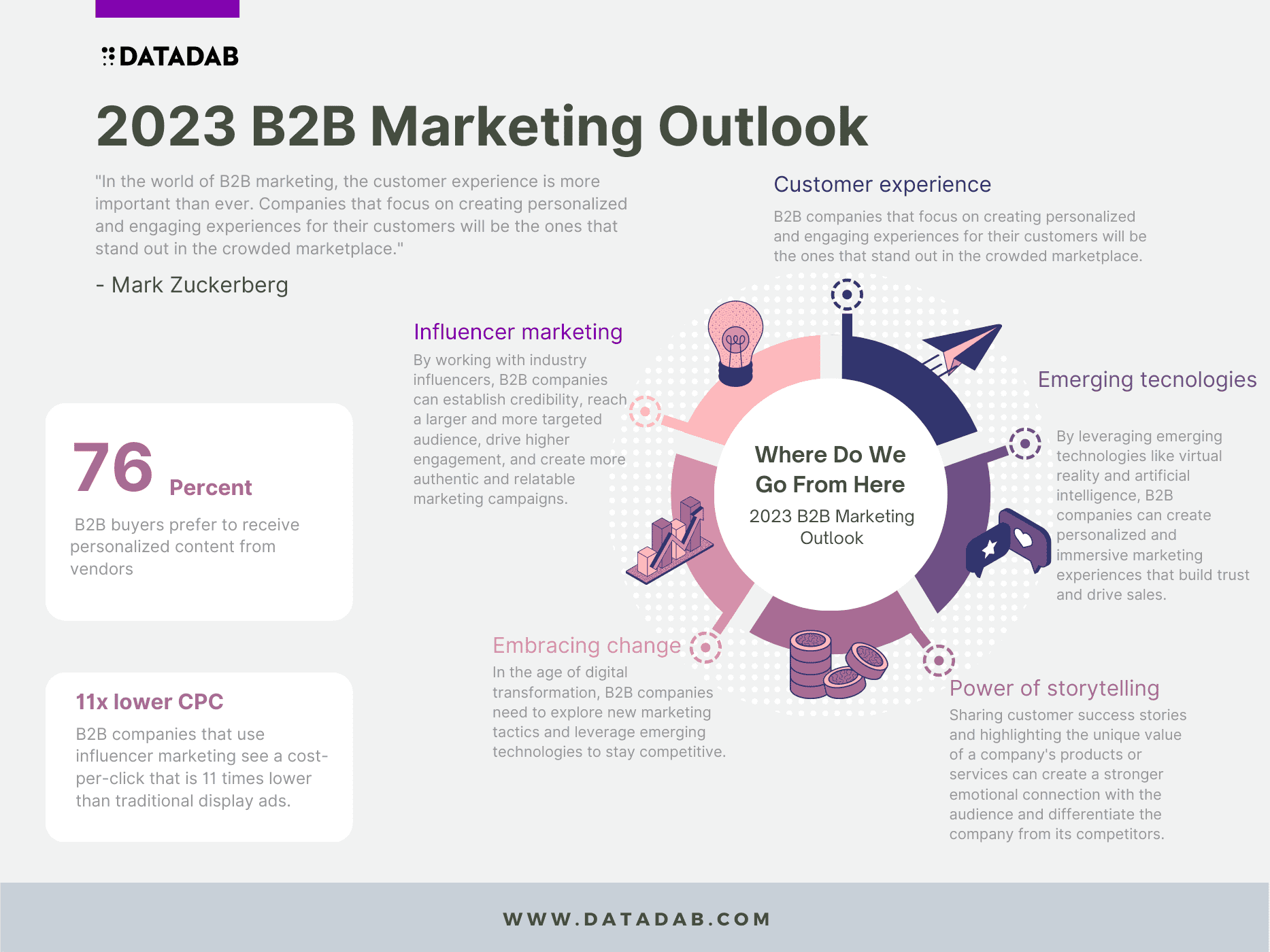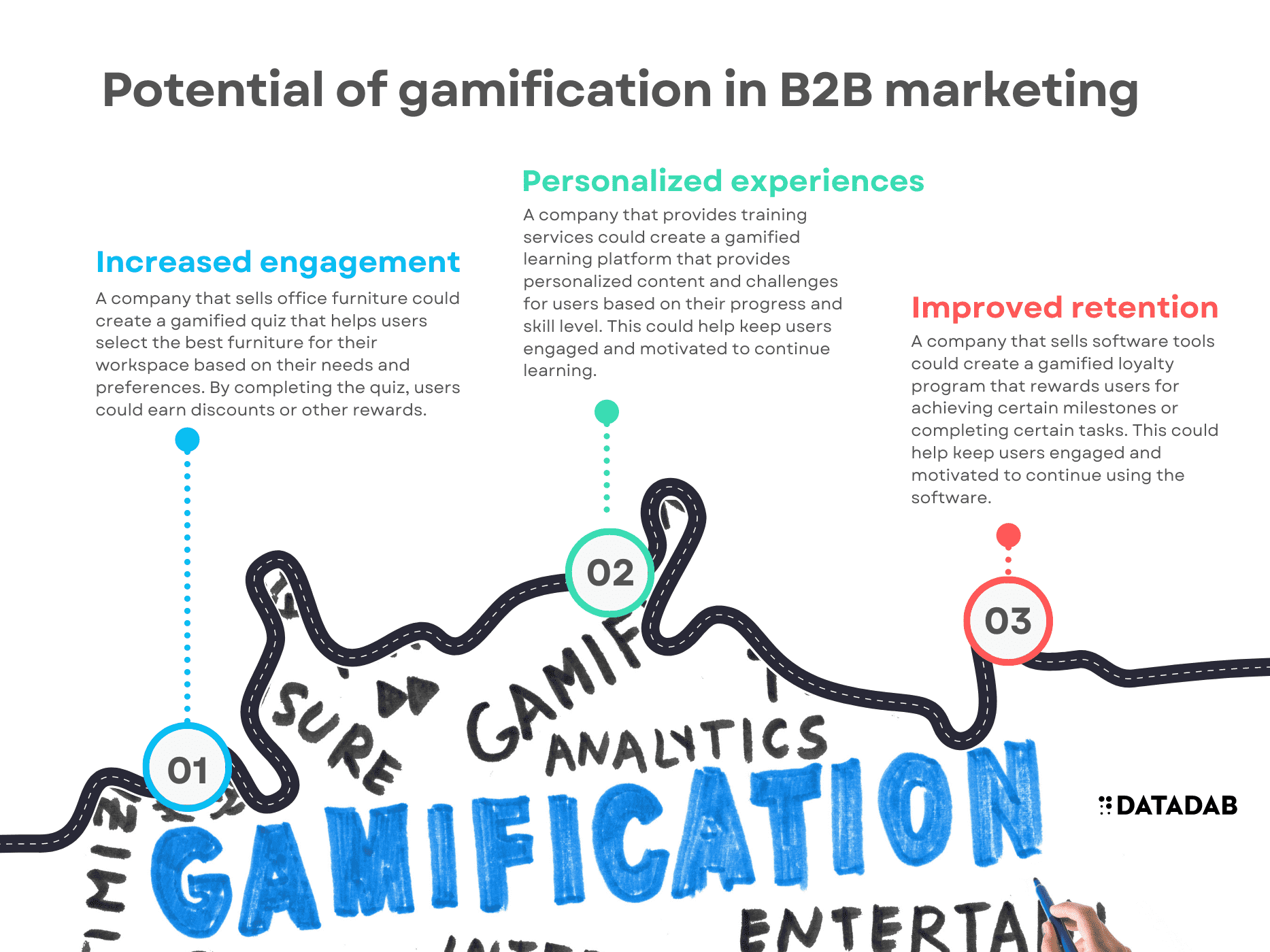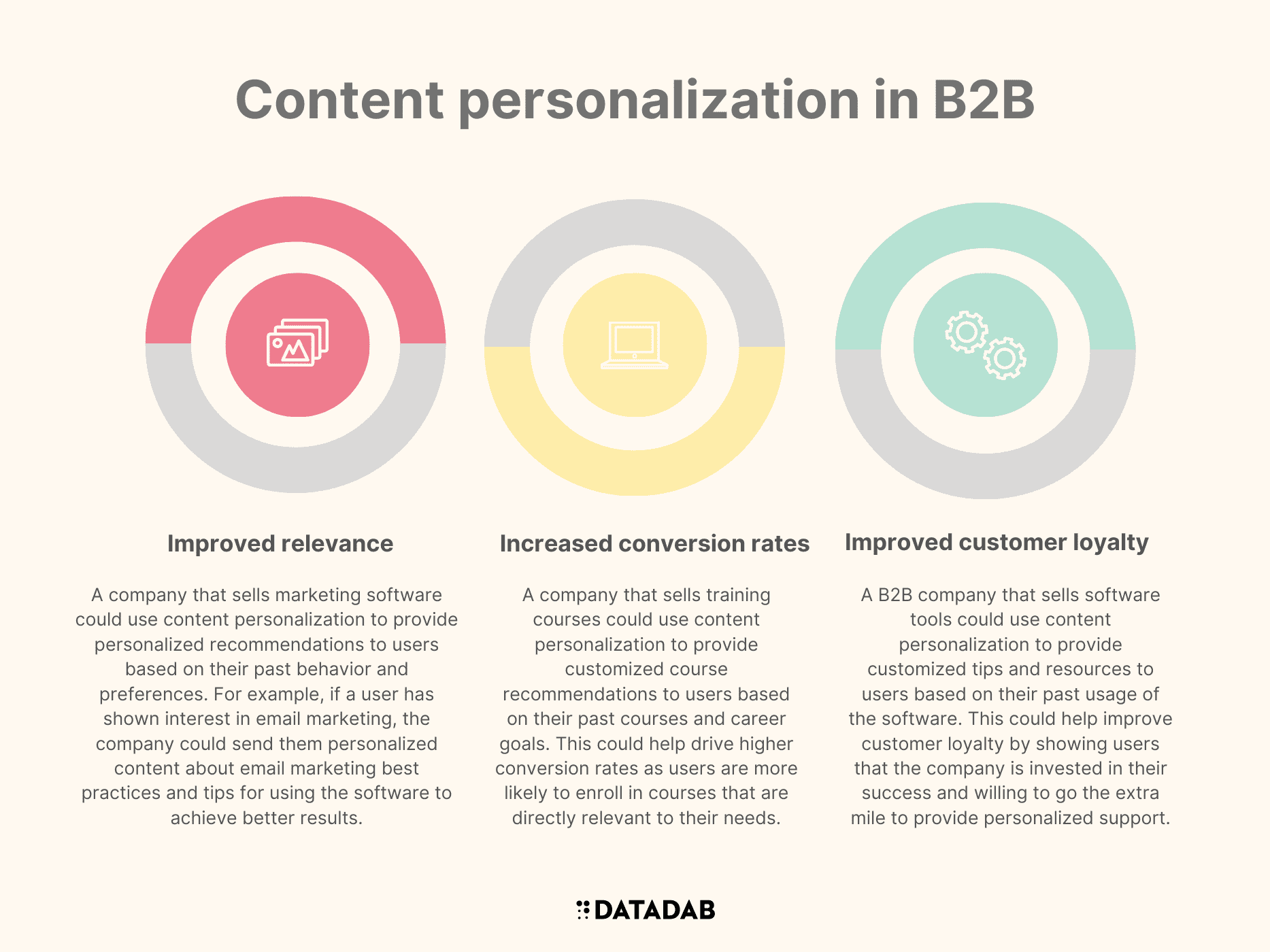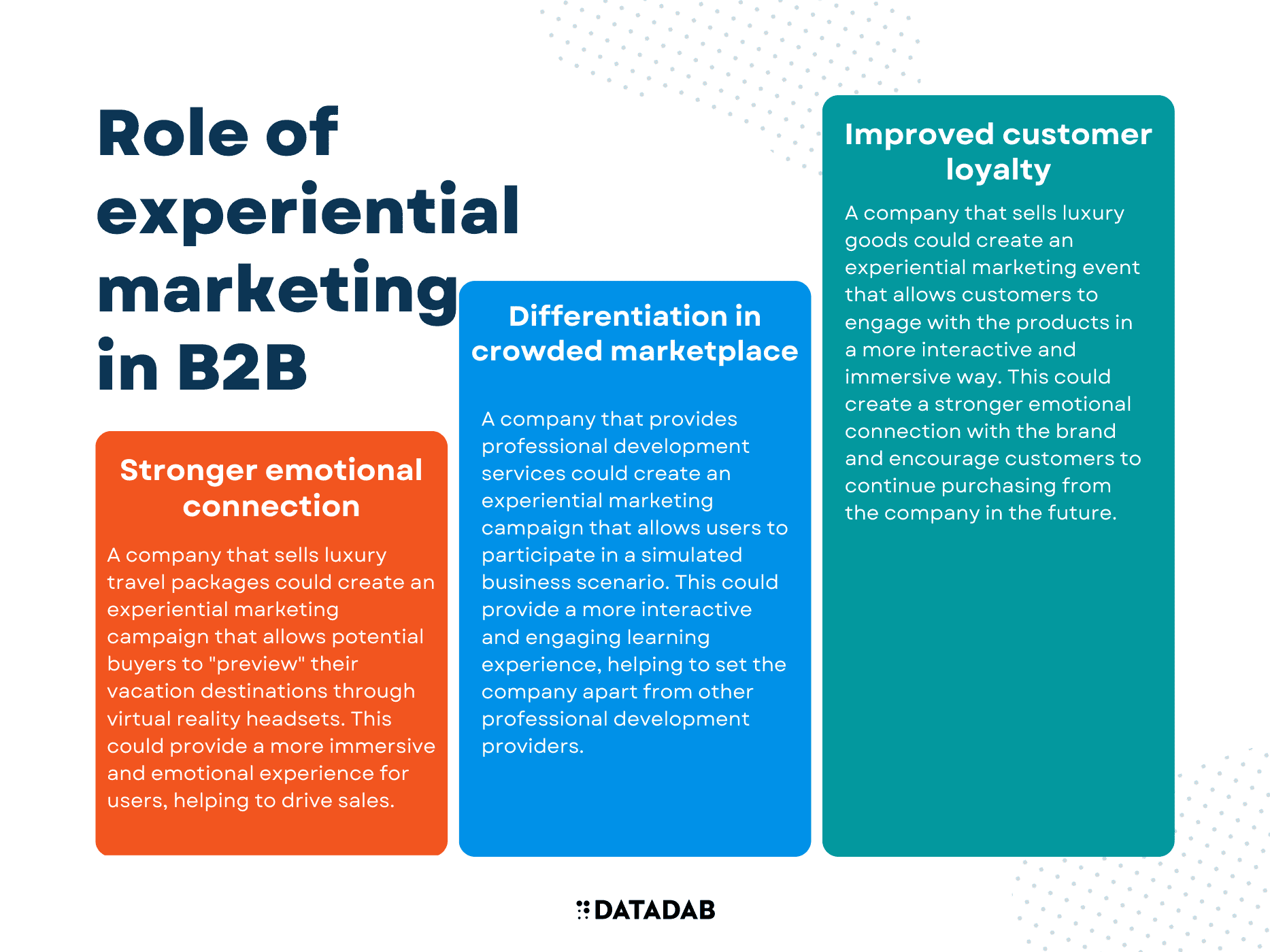"In the age of digital transformation, B2B companies need to embrace change and stay ahead of the curve. This means exploring new marketing tactics like gamification and experiential marketing and leveraging the power of emerging technologies like augmented reality and artificial intelligence."

As we approach the end of 2022, B2B marketers are looking ahead to what the next year will bring. While plenty of tried and true tactics will continue to be effective in 2023, several lesser-known strategies could be worth considering. In this article, we'll explore a few ideas B2B marketers might want to keep in mind as they plan for the coming year.
Micro-influencer marketing
Influencer marketing has been a popular tactic in the B2B world for a while now, but securing partnerships with major influencers can be expensive and time-consuming. An alternative approach is to work with micro-influencers - individuals with smaller, highly-engaged followings in a specific niche. According to a survey by Influencer Marketing Hub, micro-influencer campaigns have a higher average engagement rate (8%) compared to campaigns featuring celebrities (4.1%). Plus, working with micro-influencers can be more cost-effective and easier to manage than working with stars. By partnering with micro-influencers in your industry, you can tap into their already-established audience and build trust and credibility for your brand.
| Metric | Micro-influencer | Celebrity |
|---|---|---|
| Average engagement rate | 8% | 4.1% |
| Cost | Lower | Higher |
| Management | Easier | More difficult |

Interactive content
In a world where attention is increasingly scarce, interactive content can be a powerful way to engage and retain your audience's attention. This could include quizzes, polls, surveys, and other types of content that encourage readers to participate actively. According to a study by Content Marketing Institute, interactive content generates twice as much conversion as passive content and is more likely to be shared. Creating interactive content that resonates with your audience and addresses their needs and interests can drive more engagement and lead generation.
| Metric | Interactive content | Passive content |
|---|---|---|
| Conversion rate | 2x higher | Same |
| Likelihood of being shared | Higher | Same |
Account-based marketing
Account-based marketing (ABM) is a targeted approach that focuses on specific accounts or companies rather than broad demographics. This can be an incredibly effective strategy for B2B companies looking to win over key decision-makers at large organizations. By creating personalized campaigns and messaging that speak directly to the needs of these key accounts, B2B companies can better position themselves for success. According to a survey by Demand Gen Report, ABM has a higher ROI (91%) than other marketing tactics. By adopting an ABM approach, you can tailor your marketing efforts to your target accounts' specific needs and pain points, increasing the likelihood of success.
| Metric | ABM | Other tactics |
|---|---|---|
| ROI | 91% | Lower |

Personalized landing pages
Personalization is critical in today's marketing landscape, and that includes your landing pages. By creating customized landing pages that speak to the specific needs and interests of different audience segments, you can increase conversions and boost your ROI. According to a study by Unbounce, personalized landing pages can lead to a 95% increase in conversion rates. By tailoring your landing pages to the individual needs of your audience, you can provide a more relevant and compelling experience, increasing the likelihood of conversion.
| Metric | Personalized landing pages | Non-personalized landing pages |
|---|---|---|
| Conversion rate | 95% higher | Same |
Interactive webinars
Webinars have long been a popular way for B2B companies to reach and engage with their audience, but in 2023, we can expect to see more interactive webinars. By incorporating elements like live Q&A, polls, and interactive quizzes, B2B companies can create a more engaging and interactive experience for their attendees. According to a survey by ON24, interactive webinars have a higher average attendance rate (57%) than non-interactive webinars (40%). By making your webinars more interactive, you can encourage more participation and engagement from your attendees, making your webinars more valuable and memorable.
| Metric | Interactive webinars | Non-interactive webinars |
|---|---|---|
| Average attendance rate | 57% | 40% |
The role of virtual events in B2B marketing
The pandemic has led to a surge in virtual events, and this trend will likely continue even as in-person events make a comeback. Virtual events can be a cost-effective and convenient way for B2B companies to reach and engage with their audience. They offer a variety of formats to choose from, including webinars, virtual conferences, and live streams. In 2023, B2B marketers will need to get creative in their approach to virtual events, perhaps by incorporating interactive elements or offering on-demand content to extend the reach of their events. By embracing virtual events, you can reach a wider audience and create meaningful connections with your customers, even when in-person events are not possible.
| Metric | Virtual events | In-person events |
|---|---|---|
| Cost | Lower | Higher |
| Convenience | Higher | Lower |
| Potential audience reach | Wider | Narrower |

The importance of storytelling in B2B marketing
Storytelling is a powerful way to connect with your audience and differentiate your brand in a crowded marketplace. In the B2B world, this might involve sharing customer success stories, highlighting the unique benefits of your products or services, or weaving a compelling narrative around your company's mission and values. By crafting a compelling story, B2B companies can create a stronger emotional connection with their audience and stand out in a sea of competitors. By telling your company's story in an authentic and relatable way, you can create a more personal and memorable connection with your audience.
The potential of chatbots and AI for B2B marketing
Artificial intelligence and chatbots can be valuable tools for B2B marketers looking to improve their customer experience and streamline their operations. For example, chatbots can provide personalized recommendations, answer frequently asked questions, and even handle simple customer service tasks. Additionally, AI can analyze customer data and provide insights that can inform marketing strategies and improve targeting. We have all seen how crazy smart chat GPT is, and as AI and chatbots become even more advanced (with GPT4 launch soon), we expect to see more B2B companies leveraging these technologies to drive business results. Integrating chatbots and AI into your marketing efforts can provide a more efficient and personalized experience for your customers, improving their overall satisfaction.
The role of customer reviews and ratings in B2B marketing
In the B2B world, word-of-mouth recommendations can be particularly powerful. Customer reviews and ratings can provide valuable social proof for potential buyers, helping them to make more informed decisions. In 2023, B2B companies will need to pay attention to their online reputation and work to collect and showcase positive customer reviews. This could involve setting up review pages on their website, encouraging customers to leave reviews on third-party sites like Google or Yelp, and constructively responding to negative reviews. By prioritizing customer feedback and reviews, you can build trust and credibility with your audience and demonstrate the value of your products or services.
| Metric | Customer reviews | Other forms of social proof |
|---|---|---|
| Trust and credibility | Higher | Lower |
| Decision-making process | Influential | Less influential |
The potential of emerging technologies like AR and VR in B2B marketing
While they're still in the early stages of adoption, augmented reality (AR) and virtual reality (VR) can revolutionize the way B2B companies market themselves. For example, AR and VR could be used to create immersive product demonstrations, virtual trade show experiences, and interactive training programs. While it may take a while for these technologies to become mainstream, it's worth keeping an eye on their potential and considering how they might fit into your marketing mix in the future. By embracing emerging technologies like AR and VR, you can create innovative and memorable marketing experiences that set you apart from your competitors.
As you can see, there are plenty of exciting and innovative marketing strategies that B2B companies can consider in 2023. You can position your company for success in the coming year by staying up-to-date on the latest trends and techniques. Be sure to back up your strategies with industry reports, research, and data to make your marketing efforts even more effective. With the right approach and a willingness to embrace new ideas, you can stay ahead of the curve and drive meaningful results for your business.






